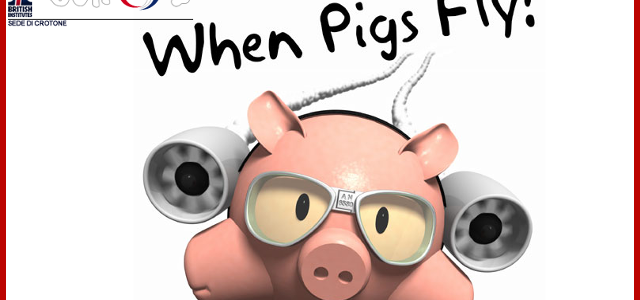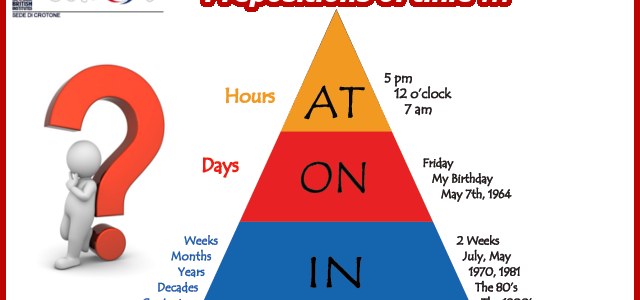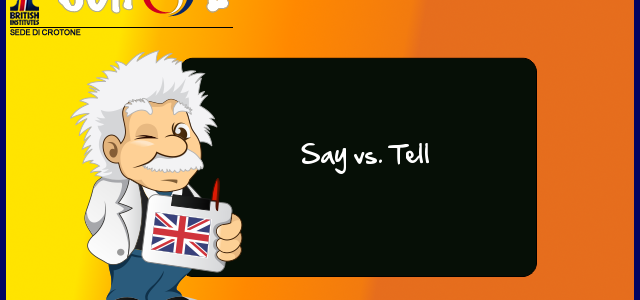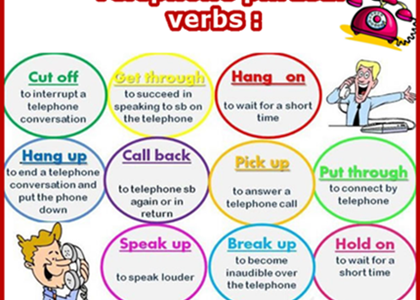 Febbraio 26th, 2015 by paperx
Febbraio 26th, 2015 by paperx
HOW TO USE WILL
| Use : |
Examples: |
- to make predictions (per fare previsioni)
|
You‘ll enjoy the party because all your friends will be there.
Ti divertirai alla festa perchè tutti i tuoi amici saranno lì. |
- for decisions made at the moment of speaking
(decisioni prese al momento in cui si parla) |
I‘ll buy this dress, I love it!
Comprerò questo vestito, lo adoro! |
- to make promises, requests, offers
(per fare promesse, richieste ed offerte) |
I‘ll help you with the house work.
Ti aiuterò con le faccende di casa. |
- in first conditional sentences to talk about real and possible situations.
(nel primo condizionale per parlare di situazioni reali e possibili) |
I‘ll come if I have time.
Verrò se avrò tempo. |
 Febbraio 24th, 2015 by paperx
Febbraio 24th, 2015 by paperx
Sapete cosa significa : When pigs fly?
Letteralmente si traduce come : Quando i maiali volano, ma in realtà sta a significare un qualcosa che è improbabile che accada, un po’ come il nostro “quando gli asini volano“!!
Examples:
I’ll win the lottery when pigs fly!!! = Vincerò la lotteria quando gli asini voleranno!!
She will pay you back when pigs fly! = Ti restituirà i soldi quando gli asini voleranno!!
 Febbraio 21st, 2015 by paperx
Febbraio 21st, 2015 by paperx
Le preposizioni di tempo, dove usare IN, AT e ON !!!
| IN |
AT |
ON |
| Months: in January / in April |
Clock times: at 7.30 a.m. / at 5 o’clock |
Days of the week: on Monday |
| Seasons: in spring / in winter |
Holiday periods: at Christmas, at Easter |
Dates: on November 22nd |
| Years: in 1984 / in 2015 |
Exceptions: at night / at the weekend |
Special days: on my birthday / on New Year’s Eve |
| Centuries: in the 20th century |
|
|
| Times of day: in the morning /in the evening |
|
|
| Longer periods of time: in the past / in the 1990s / in the holidays |
|
|
 Febbraio 20th, 2015 by paperx
Febbraio 20th, 2015 by paperx
I verbi say e tell hanno significati simili. Entrambi significano “dire”, ma vengono usati in modo diverso.
Il modo più semplice di pensarli è :
- You say something. ( dire qualcosa)
- You tell someone something. ( dire/raccontare a qualcuno qualcosa)
| You say something |
You tell someone something |
| Anna said that she was tired. |
Anna told Jack that she was tired. |
| Marco says you have a new job. |
Marco tells me you have a new job |
| Giulia said: “I love you.” |
Giulia told Jack that she loved him. |
|
|
Ovviamente non è sempre così semplice. Ecco altre piccole regole da seguire:
Di solito tell è seguito dal complemento di termine ( la persona a cui stiamo parlando).
- She told me that she loved Jack. = Lei MI ha detto che amava Jack.
- He told everybody that he had to leave. = Lui ha detto A TUTTI che doveva andare via.
Potevamo esprimere lo stesso concetto usando say, ma in quel caso avremmo dovuto omettere la persona con cui stavamo parlando:
- She said that she loved Jack. = Lei ha detto che amava Jack. ( non abbiamo specificato a chi l’ha detto)
- He said that he had to leave. = Lui ha detto che doveva andare via.
Quando usiamo say e vogliamo anche dire con chi stiamo parlando, useremo say “to someone”
- He said to me that he was tired. = Lui MI ha detto che era stanco.
- Anna said to Marco that she loved him. = Anna ha detto A MARCO che lo amava.
Nel discorso diretto generalmente usiamo say, usiamo invece tell solo quando diamo delle istruzioni o informazioni:
- He told her: “Open the door quietly.” = Lui le ha detto : “Apri la porta silenziosamente”
- She told me, “I have never been to England.”= Lei mi ha detto, “Io non sono mai stata in Inghilterra”.
Possiamo SOLO usare say e NON tell con il discorso diretto :
- She said: “Do you love me?”
- The policeman said to the prisoner, “Where were you at 8 pm?”
Con il discorso indiretto possiamo usare SIA say CHE tell per riportare informazioni:
- She said that it was raining.
- She told me that it was raining.
Ci sono alcuni modi di dire dove si deve usare SOLO tell.
- tell (someone) a story = raccontare una storia
- tell (someone) a lie = raccontare una bugia
- tell (someone) the truth = raccontare la verità
- tell the future ( to know what the future will bring) = dire il futuro
- tell the time (know how to read a clock) = leggere l’ora
 Febbraio 19th, 2015 by paperx
Febbraio 19th, 2015 by paperx
Per chi non sapesse cosa sono i Phrasal Verbs consiglio di leggere questo articolo: Phrasal Verb lesson 1 .
Oggi vediamo alcuni Phrasal Verbs utili durante le conversazioni telefoniche:
- Cut off = to interrupt a telephone conversation : è caduta la comunicazione, telefono isolato
Example:
Our phone line was cut off because we forgot to pay the bill last month = La nostra linea telefonica è stata interrotta perchè ci siamo dimenticati di pagare la bolletta lo scorso mese.
- Get through = to succeed in speaking to somebody on the phone : riuscire a contattare qualcuno al telefono
Example :
I’m trying to get through to my boss but he’s not answering his phone. = Sto cercando di contattare il mio capo, ma non risponde al telefono.
- Hang on = to wait for a short time : aspettare per poco tempo
Example:
A: Can I make an appointment for tomorrow? = Posso prendere un appuntamento per domani?
B: Hang on! I need to check if there are any spots free. = Un attimo! Ho bisogno di controllare se ci sono posti liberi
- Hang up = to end a telephone conversation and put the phone down : riagganciare il telefono
Example:
I was arguing with my friend and she hung up on me ! = Stavo discutendo con la mia amica e lei mi ha riagganciato in faccia !
- Call back = to telephone somebody again or in return = richiamare
Example:
I’ll call back when I can. = Richiamo appena posso.
- Pick up = to answer a telephone call : rispondere al telefono
Example:
I let the phone ring for ages but he didn’t pick up. = Ho fatto squillare il telefono per tanto tempo ma non ha risposto!
- Put through = to connect by telephone : mettere in linea, passare la comunicazione
Example:
I’ll put you through to the switchboard.= Passo la comunicazione al centralino.
- Speak up = to speak louder : parlare più forte
Example:
Could you speak up, please? I can’t hear you well. = Può parlare più forte perfavore? Non riesco a sentirla bene.
- Break up = to become inaudible over the telephone : a volte perdere il segnale telefonico e quindi diventare impercettibile.
Example:
You are breaking up, I hear you very bad = Stai perdendo il segnale, ti sento poco.
- Hold on = to wait : attendere in linea
Example :
A: Can I talk to Camille? = Posso parlare con Camille?
B: Hold on. I’ll see if she’s here. = Aspetti. Vedo se è qui.
 Febbraio 17th, 2015 by paperx
Febbraio 17th, 2015 by paperx
- To break the ice = is to do or say something that makes people feel less shy or embarassed in social settings : corrisponde al nostro “rompere il ghiaccio”.
Example:
It’s hard to break the ice at formal events = E’ difficile rompere il ghiaccio durante gli eventi formali.
- Put someone or something on ice = to postpone acting on someone or something, to delay something : significa rimandare qualcosa o far aspettare qualcuno.
Example:
Both projects have been put on ice until they can be paid for = Entrambi i progetti sono stati sospesi, fino a quando non possono essere pagati.
- To be snowed under = exceptionally busy, to have too much work to do : significa essere molto occupati.
Example :
I’m really snowed under at the moment. I don’t know what I should do first. = Al momento sono super impegnata. Non so cosa devo fare per prima.
- Get cold feet = to suddenly become too frightened to do something you had planned to do : significa spaventarsi per qualcosa talmente tanto da ripensarci.
Example:
I’m worried she may be getting cold feet about our trip to Paris.= Sono preoccupata che lei possa ripensarci riguardo il nostro viaggio a Parigi.
- to be on thin ice= to be in a risky situation : significa essere in una situazione pericolosa, corrisponde al nostro “essere sul filo del rasoio“.
Example:
She was on thin ice when her mother saw her grades = Lei era sul filo del rasoio quando la madre ha visto i suoi voti.






